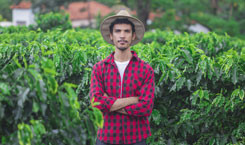Coffee from Brazil
As the biggest coffee producing country in the world, Brazil features anything from cheap qualities to some of the most exquisite specialty coffees. Since Brazil is also the country with the biggest coffee consumption after the USA, most of the countries products aren't actually being exported.

The History
After the first coffee made its way to Brazil through a lot of intrigues and with the aid of the courageous Portuguese Corporal, Francisco de Mello Palheta in 1727, coffee rapidly developed into the first and most successful Brazilian export-exclusivity. What was originally intended for the domestic market only developed into a huge hit during the time, Haiti, the previous coffee-ruler, suffered from crisis.
During the end of the 19th century, coffee was the most important economical factor of the country, by far. About 75% of the world production came from Brazil at that time. Back then just as today, 98% or the Brazilian coffee is produced in the four states of Sao Paolo, Espirito San, Minas Gerais and Parana. Because of the favorable climate conditions and because there was no foreign capital involved in developing the industry, the Brazilian coffee sector remained strong ever since.
Today, coffee is only responsible for about 10% of Brazils GDP, products like soy and iron took over. Still, over 3.5 million people are employed in the coffee sector and the country is living a rich and important coffee culture.
The Brazilian Coffees
Most of the Brazilian coffee is Arabica with some Robustas being farmed in the spacious Brazilian mountains and high plateaus. As the fifth largest country in the world, Brazil offers everything from humid rainforests of the amazon basin over mountain forests and savannas to amazing beaches. The conditions for growing coffee vary considerably, causing beans of the exact same variety of the coffea arabica plants, grown in a different place, to often taste differently.
In the south-east of the country, the newly discovered arabica variety „Bourbon“ is especially popular. With its mild and fine flavors and a subtle vanilla aroma, this bean has become really popular in a short period of time. Beans, grown in the eastern, coastal region can taste a little bit like ocean water. A flavor that may sound unusual to us while being extremely popular in eastern Europe. Generally, Brazilian coffee is described as mild and low in acidity.

Trouble-Maker Brazil
Naturally, the unbelievable dimensions of the coffee production in Brazil started having undesirable consequences for the country many decades ago. Until 1888, almost all of the Brazilian plantations were run with slaves from Africa and even after slavery was officially prohibited, the employment conditions only changed slowly.
Today, the main problem of the coffee production is the frequent use of dangerous pesticides and fertilizers. Without these, most of the sensible monocultures of the country would not be profitable at all. Even though, all pesticides and fertilizers inside of the coffee beans become harmless during the process of roasting them, a lot of the workers, exposed to the chemicals, suffer from health issues like cancer. Just like the farmers and their workers, the very unique nature of Brazil is not exactly profiting from this either.
Brazil is on a better way today with a lot of small cooperatives of micro-farmers and trying to take on the large corporations by direct fair trade and trying to protect and respect their environment and the native life.

